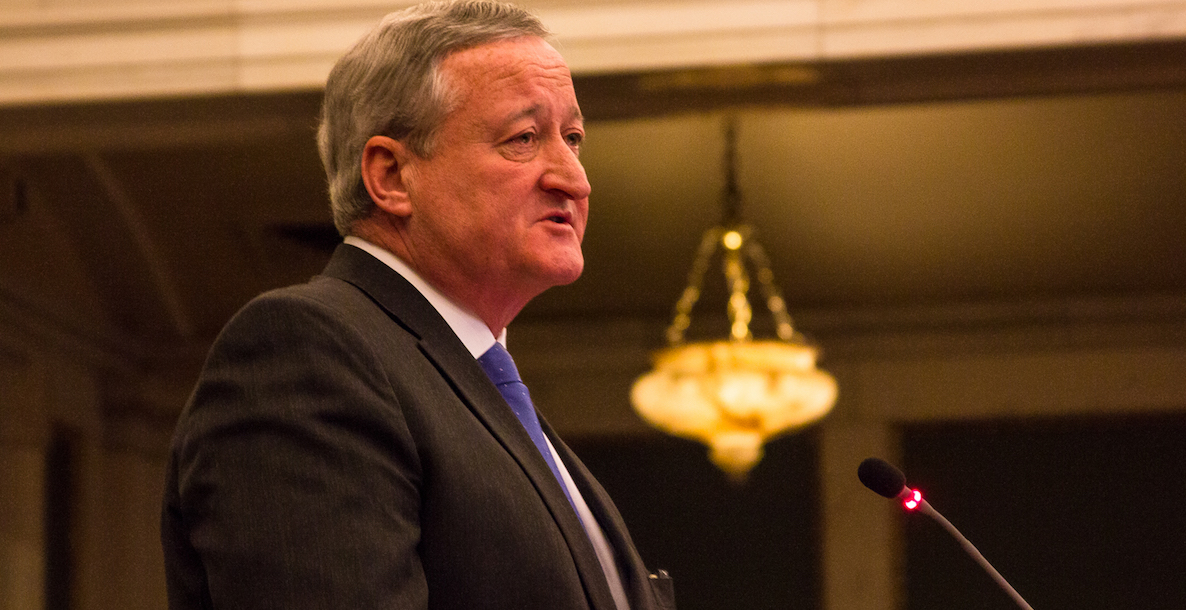Earlier this week, after penning a classic case of blame-the-messenger defensiveness in the pages of the Inquirer that attacked City Controller Rebecca Rhynhart’s recent report showing the city of Philadelphia leads the nation in the mishandling of taxpayer money, (We’re Number One!), Mayor Kenney called a press conference to announce that he was creating a “Resolution Task Force” to address the issue. And he promptly appointed a bunch of his cronies to it, along with the very people who, uh, kinda helped to create the problem in the first place. Welcome to reform, Kenney-style. How Putin-like was Kenney’s move? The papers didn’t even cover his press conference, no doubt seeing it as spin—not news.
Now, the above might sound like a pretty loaded first paragraph, but it’s really the most accurate I could come up with. Since late April, when Councilman Allan Domb’s cross-examinations of befuddled Finance Director Rob Dubow and Treasurer Rasheia Johnson revealed the city’s accounting woes—the missing $33 million, the millions in unreconciled accounts, the $924 million in accounting errors Rhynhart unearthed—we’ve been treated to half-truths, stammering obfuscations and stunning examples of incompetence. Through it all, when the Mayor hasn’t been silent, he’s been thin-skinned, telling one TV reporter when questioned about the missing $33 million from the city’s consolidated cash account: “Reconciling is not missing.” Just paperwork, right? Problem is, it’s now six weeks later and if your answer to the question “where’s the money?” is still “I don’t know”…guess what? It’s missing.
Kenney remained silent while his deputies tripped over Domb’s questions during Council hearings. Now, after Rhynhart’s devastating report, he’s come out of his shell, attacking her in the op-ed and announcing this sham of a task force. Let’s walk through both.
Mayor Kenney appointed a bunch of his cronies to the Task Force, along with the very people who, uh, kinda helped created the problem in the first place. Welcome to reform, Kenney-style.
First, the op-ed. Kenney zeroes in on Rhynhart’s finding of $924 million in accounting errors and accuses her of “recklessly” inflating that number. He argues that that figure comes from an earlier draft of the city’s Comprehensive Annual Finance Report or CAFR; in the back and forth between the city and the controller’s office leading up to the final CAFR report, Kenney points out, all of those errors had been corrected. Rhynhart’s argument is that the city shouldn’t rely on her—the auditor—to get its accounting right. She should be finding mistakes at the margins, she says, but not nearly $1 billion worth.
Who’s right? I’m no accountant, but it wasn’t hard to find the dude who pretty much invented the very notion of municipal finance. He’s right in our backyard. Ed DeSeve is a Philadelphian, and a legend. He was the city’s finance director under Mayor Bill Green and went on to found Public Financial Management, the company that is the gold standard for municipal finance. (It was PFM that authored Ed Rendell’s fiscal plan that brought the city back from the brink of bankruptcy in the early ‘90s). DeSeve has been the CFO of HUD under President Clinton, the federal controller from 1995-1999, and was Special Advisor to the President for Recovery Implementation back when Barack Obama passed something called the Recovery Act. It was DeSeve who oversaw its rollout and implementation. An outside audit astonishingly did not have a single critical finding against DeSeve’s Recovery Act itself. There may be no better authority on government and finances on the planet.
“I read Rebecca’s report and the city has been sloppy as hell,” DeSeve says. “It’s really inexcusable and could cost the city in the credit marketplace. It’s a black mark, but at this point, it’s more of a blackhead than a pimple.”
![]()
As to Kenney’s complaint that Rhynhart based her findings on an early draft: “No draft should have $924 million in accounting errors,” he says. Indeed, note that Rhynhart’s report refers to “insufficient oversight leading to $924 million in errors in the preparation of the Comprehensive Annual Financial Report.” The emphasis on the word preparation is mine; Rhynhart’s finding, in other words, was about the sloppy process—a lack of “internal financial controls” is the accounting term of art—leading up to the final CAFR report Kenney cites.
Which gets us to the task force idea. Let’s put aside the incongruity of it; Kenney’s op-ed would have us believe that $924 million in errors is no biggie—just part of the numbers-crunching process—but yet there he is, calling a press conference and announcing that, despite all appearances until now, he really does have a sense of urgency about our crumbling fiscal house.
So he names a task force—to focus only on the reconciliation issue. Who’s on it? Does he reach out to DeSeve? Nada. What about some private sector CFOs? Hardly. Hell, what about having a taxpayer on it? Yeah, right. Instead, the co-chairs are Treasurer Rasheia Johnson and former Controller Jonathan Saidel. Now, I love Saidel. He may be the funniest politician I’ve ever met. But this is not a run at a Borscht Belt hotel we’re talking about here; Saidel is a Kenney ally and a Democratic party apparatchik who, at the press conference, dutifully threw some rhetorical barbs Rhynhart’s way.
As to Kenney’s complaint that Rhynhart based her findings on an early draft: “No draft should have $924 million in accounting errors,” says Ed DeSeve, the legendary municipal finance expert.
And how about having Finance Director Rob Dubow and Treasurer Rasheia Johnson on the task force? They’re the ones whose stories about the missing millions and the lack of reconciliation kept changing with every appearance before Councilman Domb’s insightful questioning. They’re investigating themselves. And, if you needed any further proof that this is all for show, they’re joined on the panel by Kenney Chief of Staff Jane Slusser. It’s as if President Trump announced he was forming a Task Force to get to the bottom of Russian collusion and appointed Devin Nunes, Rudy Giuliani and John Kelly to run it.
Rounding out Kenney’s phony Task Force are representatives from the Inspector General’s office, Council President Darrell Clarke’s Council staff, and PICA, the state financial oversight board. Rhynhart, exhibiting a nose for sniffing out political bullshit, declined Kenney’s invitation to join them.
Those from the IG, PICA and Council should have joined her in declining. They, like Rhynhart, should be serving as checks on the Mayor; instead, they’ve been co-opted by him. Particularly disappointing is that PICA Executive Director Harvey Rice is on the panel. PICA’s chairman, Kevin Vaughn, it’s worth noting, headed Kenney’s Super PAC.
That said, after Rhynhart presented her findings to the PICA board earlier this week, Vice Chair Alan Kessler laudably pledged to keep the city’s financial accounting woes on the board’s monthly agenda from now on. That, combined with a bill passed last week by Domb that requires regular reporting to Council from Dubow, at least promises some level of oversight moving forward.
But it’s still hard to cut through all the spin. The city has set up a website to transparently chronicle the task force’s work. Sounds like a great idea, right? Except that many of the “facts” in its timeline either self-contradict, run counter to Johnson and Dubow’s own testimony, or shade things in a way that obscures the truth.
Representatives from the Inspector’s General office, the state fiscal oversight board PICA and City Council should have declined to be on the Task Force. They, like Rhynhart, should be serving as checks on the Mayor; instead, they’ve been co-opted by him.
In fact, there are so many examples of all three that it conjures up the “Bullshit Asymmetry Principle,” an idea advanced by Italian software developer Alberto Brandolini a few years ago, which has taken on new significance in the age of Trump: “The amount of energy needed to refute bullshit is an order of magnitude bigger than to produce it.” So let’s just take perhaps the best example: In his op-ed and on the website, Kenney pats himself on the back for hiring “a nationally-recognized accounting firm” last month to audit the consolidated cash account and presumably find the missing $33 million. Of course, not mentioned is that most of said national recognition came in the form of an SEC fraud scandal that resulted in the principal of the firm, Michael Horsey, losing his accounting license for two years for engaging in improper conduct. Great hire!
Clearly, the city’s current accounting woes were exacerbated by the non-attention shown them by Dubow and Johnson. The administration’s own timeline on the website shows an unconscionable 10-month delay between the time Johnson found out about the missing millions and when Horsey’s firm was hired—six months less than Johnson testified to before Domb. That said, Kenney is right that many of these problems predated his election. In fact, past reports from former Controller Alan Butkovitz recommended many of the same fixes—more personnel, upgrading technology—that Rhynhart does.
![]()
It’s time to concede that the same old fixes aren’t cutting it. Maybe what’s old ought to be new again. DeSeve took me back to 1980, when, post-Frank Rizzo, the city’s books were a mess. (DeSeve had been Rizzo’s Budget Director, but resigned over Rizzo’s fiscal recklessness). He brought in an esteemed outside accounting firm to audit the city to reassure the financial markets. “I wanted a clean opinion,” he says. The then-controller didn’t like it—that was his turf. “I told him we’ll bring in this firm to work with you, you can audit behind them,” DeSeve recalls.
Now that Kenney has launched a silly broadside at Rhynhart and an even sillier impersonation of action with the Task Force, maybe we should follow the DeSeve playbook. Bring in a national, respected accounting firm to give the Kenney administration the once-over. As DeSeve suggests, they’d likely corroborate Rhynhart’s findings. “You wouldn’t have to do it every year,” DeSeve says. “Maybe once every four years, bring in an outside audit.”
It may be the best—perhaps the only—way to keep the Kenney administration honest.
Photo via Flickr








